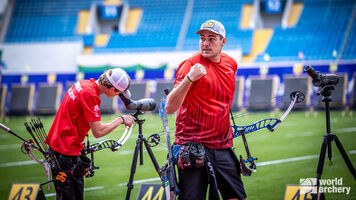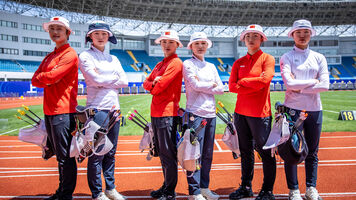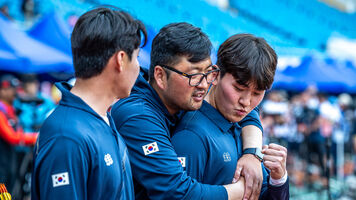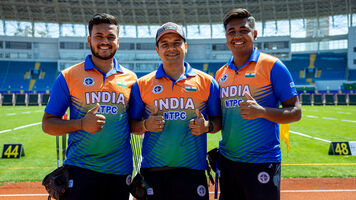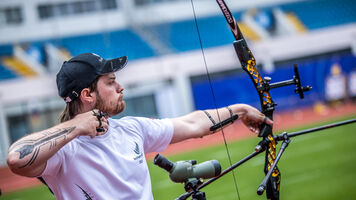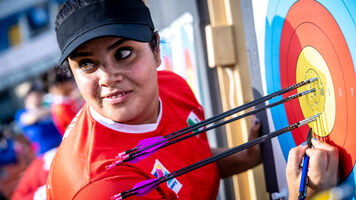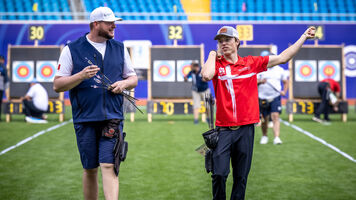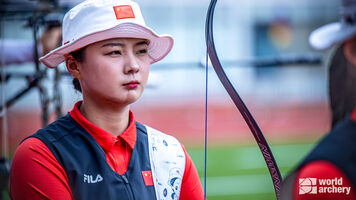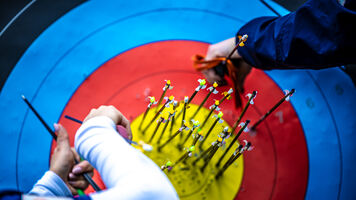This content is archived and as has not been processed. It may contain unformatted text or images, broken links or out-of-date information.
Archive
14 August 2008 - FITA discusses new IOC member ERDENER (TUR)
Lausanne
FITA discusses new IOC member ERDENER (TUR)
Beijing – 14 August 2008
FITA President Prof. Dr. ERDENER
The International Archery Federation (FITA) executives Prof. Dr. Ugur ERDENER (TUR), Mr. Paul H. PAULSEN (NOR) and Mr. Tom DIELEN (BEL) gave a press conference at the Olympic Green Archery Field on Wednesday.
Prof. Dr. Ugur ERDENER (TUR) - FITA President and IOC member
On whether his election to the IOC will help archery gain more recognition:
"Archery is one of the core sports for the Olympics, and we are very happy for the situation. It's a great honour for me and my sport. In another way, it is a great responsibility for me because we have to do our best for the future."
Mr. Paul H. PAULSEN (NOR) - FITA First Vice-President
On improving sports presentation:
"The vitality and importance of sports presentation is so great. If we have a bad sports presentation, then the results, our game and our sports presentation will be reduced. We feel that sports presentation here has been very good. We need that for all the Games and our own competitions (Beijing 2008, London 2012, etc.)"
Mr. Tom DIELEN (BEL) - FITA Secretary General and Executive Director
On whether ERDENER's election will help archery gain more recognition:
"We have been working since 2005 on a plan and our goal is to make archery an internationally recognised sport for the London 2012 Games. We are mainly focusing on improving competition between the Olympics. The fact that our president was selected out of 110 candidates shows that we are on the right track for recognition, but it's not something that happens right away."
On what he would like to improve for London 2012:
"The first thing is presentation. We know that we are going to be at one of the most famous venues, Lord's cricket field. The second thing is the use of Court A and B. We might reconsider having two fields and maybe prolong the schedule a little bit. We may be having three sessions a day and one finals field.
"We might consider the way we score. We're going to do testing with a set system. And we will continue to work with broadcasters to make it more visible. We will do some testing at the World Cup Final in September, maybe using heart rate measures to see if we can really see when the archer is under pressure. We would like to see where the archer is aiming in real time, but cost is a concern. It's not as easy as it might look because we don't want to put something on the archer's bow so it changes the weight of the bow and so on."
On advantages and disadvantages of B:
"There are pluses and minuses of the two fields. The minus definitely is for the archers who have only competed in Court B. We feel that they may feel like a second-class archer. That's something we're not happy with. I think everyone should have the feeling of shooting in front of a big crowd and with a video board, so that's definitely a minus. On the plus side, contrary to Athens, when we had four targets, and only two targets were televised. Here, we have both courts with television. That everyone, if they wanted to, can have TV broadcast of the archers."
On whether rules will be changed because of Korea's domination:
"We can't start changing rules to prevent a country from winning medals. This would be crazy. The reason why they are dominating is that they have a very professional approach to the sport. This approach is spreading throughout the world and we have for instance seen that some of the more traditional countries in archery have had a hard time qualifying for the Olympics and I'm pretty sure that the level is increasing everywhere. In fact we had 49 NOCs qualify for the Games. It's a new record and shows the development of the sport. The level has never been as high as it is here.
"There is no such thing as a tourist archer of the Olympics Games. The difference is getting smaller and smaller and smaller. We have seen during the World Cup circuit this year and last year that they (Korea) are not as invincible as they have been. They have a very good preparation for the Olympics and they have a great fan club here. I encourage all of the other countries to do the same because that is also important in terms of the mental edge during the match. Yes, they are very good, but my message to them is look out for the rest because I am pretty sure the other countries are catching up."
ONS mo/er/bc/ac
Edited by FITA Communication

